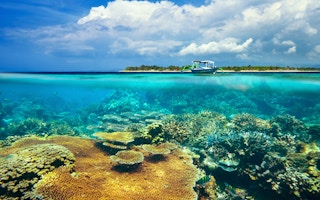Nature is on the move as the world warms. Scandinavian birds are flying north – and tropical corals are adjusting to the rise in temperatures.
The last is a surprise: the experience of El Niño years is that reef corals have been vulnerable as sea temperatures creep up. They can recover, but higher water temperatures are not healthy for reef ecosystems.
But Stephen Palumbi of Stanford University in California and colleagues report in the journal Science that at least some corals learn to adjust to hot water – and have been observed doing so at least 50 times faster than the pace of evolutionary change suggests that they should.
Coral reefs are, like the tropical rainforests, among the richest ecosystems on the planet: they are of economic importance for up to a billion people, as sources of food, as tourist attractions and as natural protection from storms.
There have been repeated alarms about the impact both of global warming and of the steady change in ocean water chemistry on tropical reefs that have already been weakened by pollution, predation and commercial exploitation.
Rising expectations
But Palumbi and colleagues decided to take a closer look at the coral animal’s living arrangements in American Samoa, where temperatures in shallow reefs can reach 35°C when low tide is around noon. Most corals are at risk at water temperatures of 30°C. So some native corals had clearly learned to adjust.
“
Coral reefs are, like the tropical rainforests, among the richest ecosystems on the planet: they are of economic importance for up to a billion people, as sources of food, as tourist attractions and as natural protection from storms
“The temperature of coral reefs is variable, so it stands to reason that corals should have some capacity to respond to different heat levels. Our study shows they can, and it may help them in future as the ocean warms,” said Palumbi.
Researchers simply transplanted cool water corals to hot pools in the laboratory and watched: they weren’t as comfortable as the corals that had long ago adapted to higher temperatures, but they swiftly achieved the heat tolerance that might be expected from generations of evolution.
The reasoning is that corals must have adaptive genes that can be turned off or switched on when conditions change.
Adapt or withdraw
“These results tell us that both nature and nurture play a role in deciding how heat-tolerant a coral colony is,” Palumbi said. “Nurture, the effect of the environment, can change heat tolerance much more quickly – within the lifetime of one coral rather than over many generations.”
The research suggests that corals stand at least some chance of adjusting to a warmer world. Other creatures, for the moment, take the other option: they can move away. In Finland, the birds are flying north.
Scientists from the Finnish Environment Institute and the Finnish Museum of Natural History report in the journal Global Change Biology that they studied a million observations of 94 species recorded between 1974 and 2010 and made a measure not just of the changing distribution of species, but of the changing abundance of populations across the terrain, to come up with a measure they called the mean weighted latitude of density.
They found that, on average, bird populations had shifted 45 kms north. Some had flown much further: black grouse, ruff, greenfinch and yellow wagtail were among 23 species that had shifted northwards by 100 kilometres. The only birds observed to be heading south were the common buzzard and the raven.

















